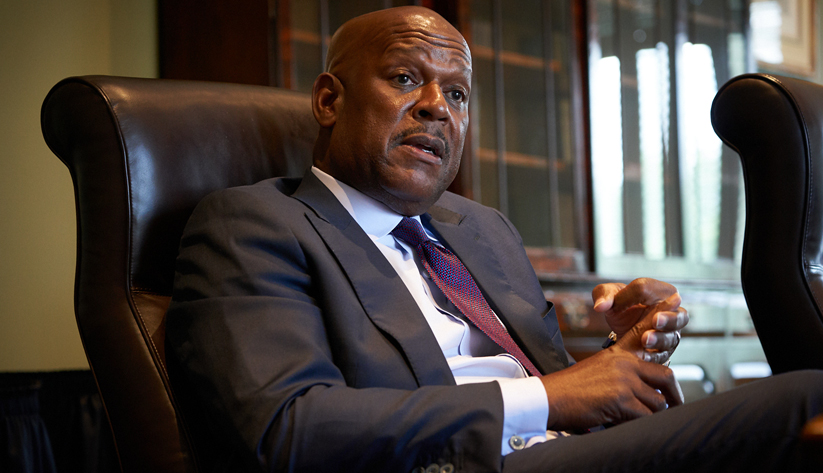
Myron Gray, recently retired president of U.S. operations at United Parcel Service, is chairman of the Federal Reserve Bank of Atlanta's board of directors. In this interview, he discusses his management philosophy, what persuaded him to join the Atlanta Fed board, and the remarkable technological advances that have reshaped the package delivery industry.
Charles Davidson: Why were you interested in joining the Bank's board?
Myron Gray: I was brought on initially as a member of the Trade and Transportation Advisory Council out of Jacksonville [Florida]. UPS obviously has been considered a bellwether for the economy. Through my initial advisory role, I became interested in the broader board and wanted to see where my talents fit and if I could be useful.
Davidson: Why is UPS viewed as an economic bellwether? How does your experience there help inform the discussion around the Atlanta Fed's boardroom table?
Gray: Because UPS is a global organization, you can get insight not only into economic activity here in the United States, but around the world, and whether trade, regulations, or tariffs are affecting business, and to what degree. On any given day, 6 to 7 percent of the world's GDP [gross domestic product] is traveling in a UPS vehicle somewhere around the globe.
Davidson: Do you have a guiding philosophy of leadership? And do you see any difference between leading and managing?
Gray: I think they're intertwined. If [I have] a style, it's an inclusive style. I've found people generally want to do a good job. And if you allow them to participate in the planning process, they will embrace it as if it's their plan. And they will do whatever it takes not to fail. On the second hand, my job was always to find the most capable individuals I could find, ensure that we had a good discussion about the strategy, and get out of the way.
Davidson: How did you come to that approach?
Gray: I became a part-time supervisor while going to the University of Memphis. Dealing with jobs on the front line and people on the front line, you begin to understand what it takes to motivate an individual. And you soon find out that if you bark and yell at people, they will do what you say, but they'll only do what you say. But if you encourage them to participate in what you're trying to accomplish, they'll not only do what you say, they will also come up with unique ways to make it even better.
Davidson: What are the biggest challenges the Fed faces?
Gray: More than ever before, it's maintaining its independence. We have strong leadership under [Fed chair] Jay Powell. But there are voices who are constantly trying to influence the Fed…the Fed has always been a data-driven organization. And I think trying to remain consistent there is probably one of its biggest challenges, while helping the broader community understand exactly what the Fed does.
Davidson: Do the regional bank boards have a role in safeguarding the Fed's independence?
Gray: I believe our role is to ensure that we stick to a decision-making process that's driven by data—not political uncertainties, not by either party. Stick to the facts, and let the facts determine your policy. As long as you're able to do that, then I think we've accomplished our goal.
Davidson: Do you have thoughts about economic mobility and how the Fed can try to advance it?
Gray: I'm particularly interested because of the makeup of the Sixth District. When you look at economic mobility, we don't rank very well. And we're least likely to have the next generation be better off than the current generation, either because of health concerns, economic concerns, or lack of education. I think the Fed and the board can play an integral role in helping to educate our lawmakers at the state and federal level about where we stand and help them be better suited to pull the right levers to help make change.
Davidson: Driverless delivery vehicles—will we see them soon?
Gray: The future will bring on driverless vehicles, whether it's autonomous vehicles that travel over highways—big semi-trucks—or whether it's an autonomous vehicle that delivers to your home. For home delivery, the package cart has been preloaded, and I send you a code, say A123. You tell me what time you want your package delivered, you walk out to the end of your driveway, punch a code, a big door opens on the vehicle, you retrieve your package, the vehicle goes on. We're done. That's going to happen.
Davidson: UPS was founded as a bicycle messenger company in Seattle in 1907. Can you talk about how the delivery business has grown and evolved over the years?
Gray: UPS has reinvented itself several times. The second location was Oakland, California, in 1919. By that time, we transformed from a messenger company into a parcel delivery company, where we were delivering goods purchased at retail stores to the home.
Then there was the advent of shopping centers, where everyone took their own goods back home. At that point, the organization became more of a business-to-business organization. Somewhere around the 1960s, that flipped. Then we became more of a consumer-driven organization. Then it was 1977, 1978 when we first established ourselves outside the U.S.
Now we do business in over 220 countries. I think the major change is our reliance on technology. We're more technology-driven than ever because the information associated with the packages sometimes is more valuable than the good itself.
Davidson: Does the close tracking of drivers' locations create challenges for the company?
Gray: Yes. It's change management at its finest, because change is initially tough to accept. I can basically sit at my desktop and tell you where every one of 70,000 drivers are at any one time. Now, the drivers like technology as much as anybody because it makes their job easier. When I was a delivery driver you had to know where every package on your package cart was, you had to memorize your route, you had to know who could sign for a package and who couldn't. Today, that's all embedded in a device.
Davidson: You worked your way all the way up the ranks. How important is it for people at the top of a big organization to understand the regular employees?
Gray: You will go nowhere without your people.




